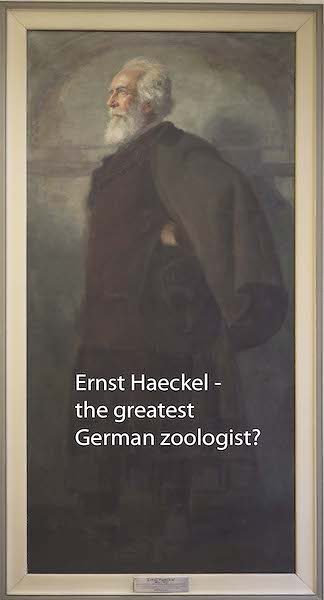[Date / Venue are changed] Seminar: “Ernst Haeckel – the greatest German Zoologist? ” by Prof. Dr. Rolf Beutel

Date
Location
Description
Prof. Dr. Rolf Beutel, Friedrich Schiller University Jena, Germany
Date
Old: Monday, March 27, 2023 (11:00 - 12:00)
New: Wednesday, March 29, 2023 (11:00 - 12:00)
Room
Old: Seminar Room C209, Center Building
New: Seminar Room C700, Lab 3
Title:
Ernst Haeckel – the greatest German Zoologist?
Abstract:
Ernst Haeckel, the founder of the Phyletisches Museum in Jena, was arguably one of the most influential German Zoologists. With his main opus “Generellen Morphologie der Organismen (1866)“ (General Morphology of Organisms) he had a tremendous impact on zoological research, also beyond Germany. He also coined many well-known scientific terms, among them ecology and phylogeny. He was awarded with the Darwin medal of the Royal Society and Thomas Alva Edison addressed him as the greatest thinker of all times. The greatest merit of Haeckel was that he adamantly promoted Darwin’s evolutionary theory in Germany, against very strong resistance. His “biogenetic law” or “recapitulation theory” became famous, ontogeny as a short recapitulation of phylogeny, even thought this was formulated earlier by v. Baehr. He was an extremely active collector and undertook expeditions in remote parts of the world. He virtually “created” the collection of the Phyletisches Museum. He was also an extremely dedicated taxonomist and described many thousands of species, of which maybe ca. 10% are still valid today. As a systematists he developed a phylogeny for the entire animal kingdom and beyond that. However, even by the standard of his time his methods of phylogenetic reconstruction were flawed. Haeckel was gifted and enthusiastic as an artist. His concept in the Phyletisches Museum was a synthesis of art and science. His later life became overshadowed by different problematic fields. He developed bizarre ideas, for instance in his book “The crystal soul”. As protagonist of the monist movement he was appointed as “Gegenpapst” (anti pope). With the outbreak of World War I he turned into an extreme nationalist and he developed also racist ideas and became a follower of social Darwinism. Not surprisingly some of his ideas and writings were later acclaimed by the Nazis. Haeckel made an enormous contribution to zoology and evolutionary biology. However, his entire work and legacy should be viewed very critically.
Subscribe to the OIST Calendar: Right-click to download, then open in your calendar application.



